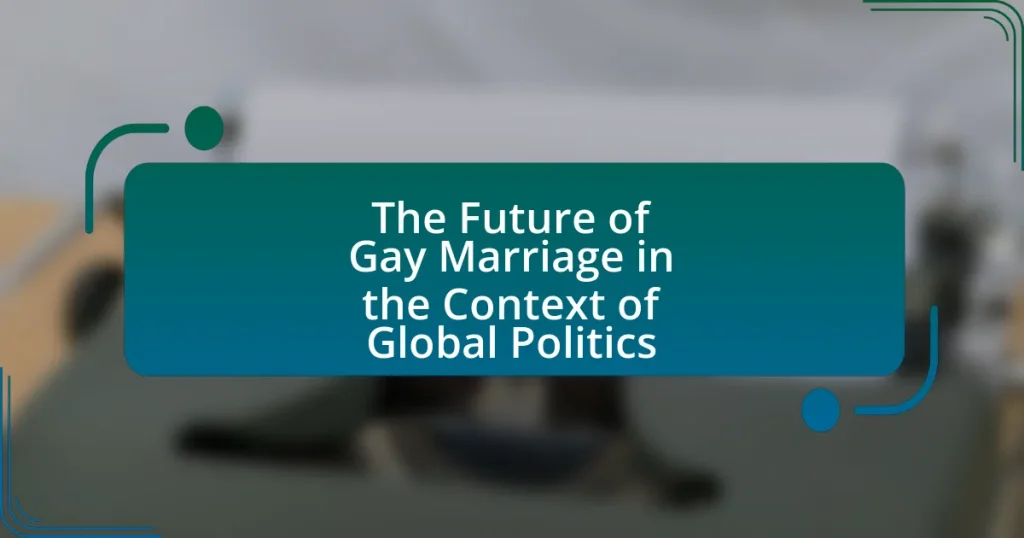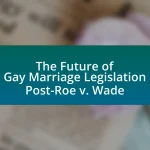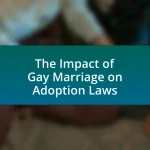The article examines the current status of gay marriage globally, highlighting that as of October 2023, it is legally recognized in 34 countries, including the United States and Canada, while many nations, particularly in Africa and the Middle East, maintain prohibitive laws against same-sex relationships. It explores the varying legal frameworks supporting gay marriage, the influence of cultural attitudes on acceptance, and significant historical milestones in its legalization. Additionally, the article discusses the impact of international human rights movements, global politics, and trade agreements on the future of gay marriage rights, as well as the challenges posed by conservative political movements and religious beliefs. Finally, it outlines effective strategies for advocates to promote marriage equality worldwide.
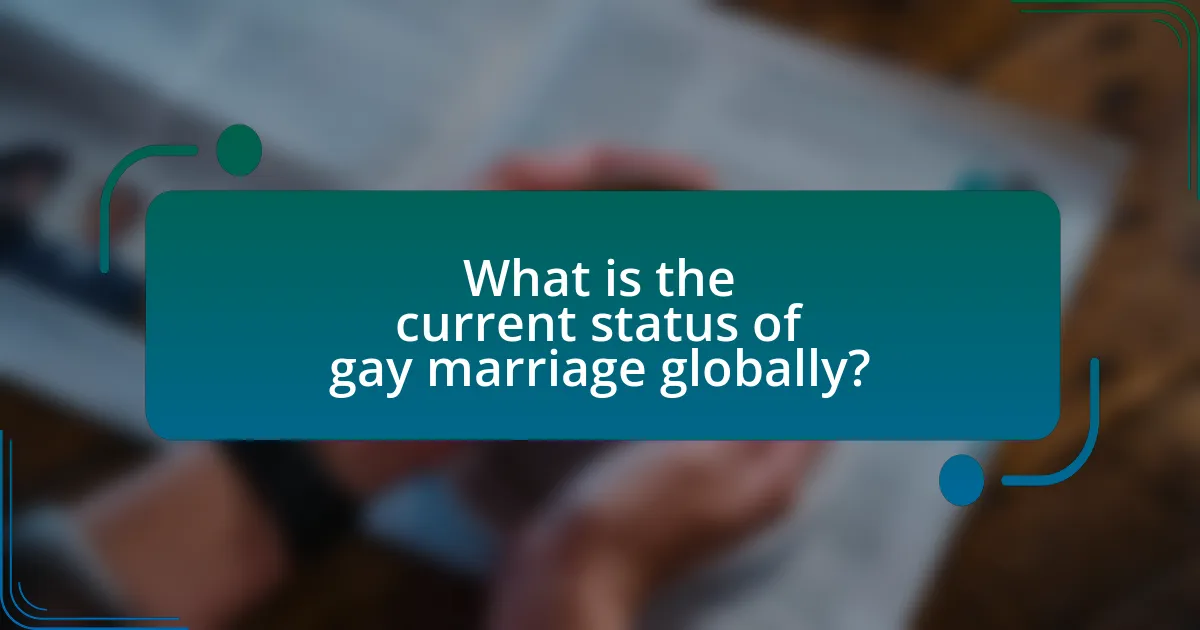
What is the current status of gay marriage globally?
As of October 2023, gay marriage is legally recognized in 34 countries worldwide. This includes nations such as the United States, Canada, and most of Western Europe, where same-sex couples can marry and enjoy the same legal rights as heterosexual couples. In contrast, many countries, particularly in Africa and the Middle East, have laws that criminalize same-sex relationships, and gay marriage remains illegal. For example, in countries like Saudi Arabia and Uganda, same-sex marriage is not only prohibited but can also lead to severe penalties. The global landscape of gay marriage continues to evolve, with ongoing debates and legal challenges influencing its acceptance and recognition in various regions.
How do different countries recognize gay marriage?
Different countries recognize gay marriage through various legal frameworks, with some nations fully legalizing it, while others offer limited recognition or no recognition at all. For instance, as of 2023, countries like Canada, the Netherlands, and Spain have legalized same-sex marriage, granting full marital rights and benefits. In contrast, countries such as Russia and many in the Middle East do not recognize gay marriage and may impose legal penalties for same-sex relationships. Additionally, some countries, like Germany and Australia, have legalized gay marriage more recently, reflecting changing societal attitudes. The recognition of gay marriage often correlates with broader human rights policies and cultural acceptance within each nation.
What are the legal frameworks supporting gay marriage in various nations?
Legal frameworks supporting gay marriage vary significantly across nations, with some countries enacting comprehensive laws while others maintain prohibitive measures. For instance, in the United States, the Supreme Court’s 2015 decision in Obergefell v. Hodges established the constitutional right to same-sex marriage, affirming that states cannot deny marriage licenses to same-sex couples. Similarly, in Canada, the Civil Marriage Act of 2005 legalized same-sex marriage nationwide, following a series of court rulings that recognized the rights of LGBTQ+ individuals. In contrast, countries like Saudi Arabia and Iran have laws that criminalize same-sex relationships, reflecting a lack of legal recognition for gay marriage. These legal frameworks are often influenced by cultural, religious, and political factors, leading to a diverse global landscape regarding the recognition of same-sex unions.
How do cultural attitudes influence the acceptance of gay marriage?
Cultural attitudes significantly influence the acceptance of gay marriage by shaping societal norms and values regarding sexual orientation and relationships. In societies where traditional views on marriage prevail, such as those emphasizing heterosexual unions, acceptance of gay marriage tends to be lower. For instance, a 2020 Pew Research Center survey indicated that acceptance rates for gay marriage were markedly higher in Western countries compared to regions like the Middle East and parts of Africa, where cultural and religious beliefs often oppose LGBTQ+ rights. This disparity illustrates how cultural context directly impacts legal recognition and social acceptance of gay marriage, with progressive attitudes fostering greater acceptance and legislative support.
What are the historical milestones in the legalization of gay marriage?
The historical milestones in the legalization of gay marriage include several key events. In 2001, the Netherlands became the first country to legalize same-sex marriage, setting a precedent for others. In 2004, Massachusetts became the first U.S. state to allow same-sex marriage, following a ruling by the Supreme Judicial Court. In 2015, the U.S. Supreme Court ruled in Obergefell v. Hodges that same-sex marriage is a constitutional right, legalizing it nationwide. Other countries followed suit, with significant milestones including Spain in 2005, Canada in 2005, and Germany in 2017. These events collectively reflect a growing acceptance and legal recognition of same-sex marriage globally.
What key events have shaped the global landscape of gay marriage rights?
Key events that have shaped the global landscape of gay marriage rights include the 2001 legalization of same-sex marriage in the Netherlands, which was the first country to do so, setting a precedent for others. Following this, numerous countries, including Canada in 2005 and Spain in 2005, enacted similar laws, reflecting a growing acceptance of LGBTQ+ rights. The landmark U.S. Supreme Court case Obergefell v. Hodges in 2015 further advanced the cause by legalizing same-sex marriage nationwide, influencing global perspectives on marriage equality. Additionally, the 2019 ruling by the Constitutional Court of Taiwan made it the first Asian nation to legalize same-sex marriage, marking a significant milestone in the region. These events collectively illustrate the evolving legal and social recognition of gay marriage rights worldwide.
How have international human rights movements impacted gay marriage legislation?
International human rights movements have significantly influenced gay marriage legislation by advocating for equality and legal recognition of same-sex relationships. These movements have raised awareness about LGBTQ+ rights, leading to legal reforms in various countries. For instance, the advocacy efforts of organizations like Human Rights Campaign and ILGA (International Lesbian, Gay, Bisexual, Trans and Intersex Association) have contributed to the legalization of gay marriage in numerous jurisdictions, including the landmark U.S. Supreme Court decision in Obergefell v. Hodges in 2015, which established same-sex marriage as a constitutional right. Additionally, international treaties and declarations, such as the Yogyakarta Principles, have provided frameworks that support the legal recognition of same-sex unions, further pressuring governments to align their laws with human rights standards.
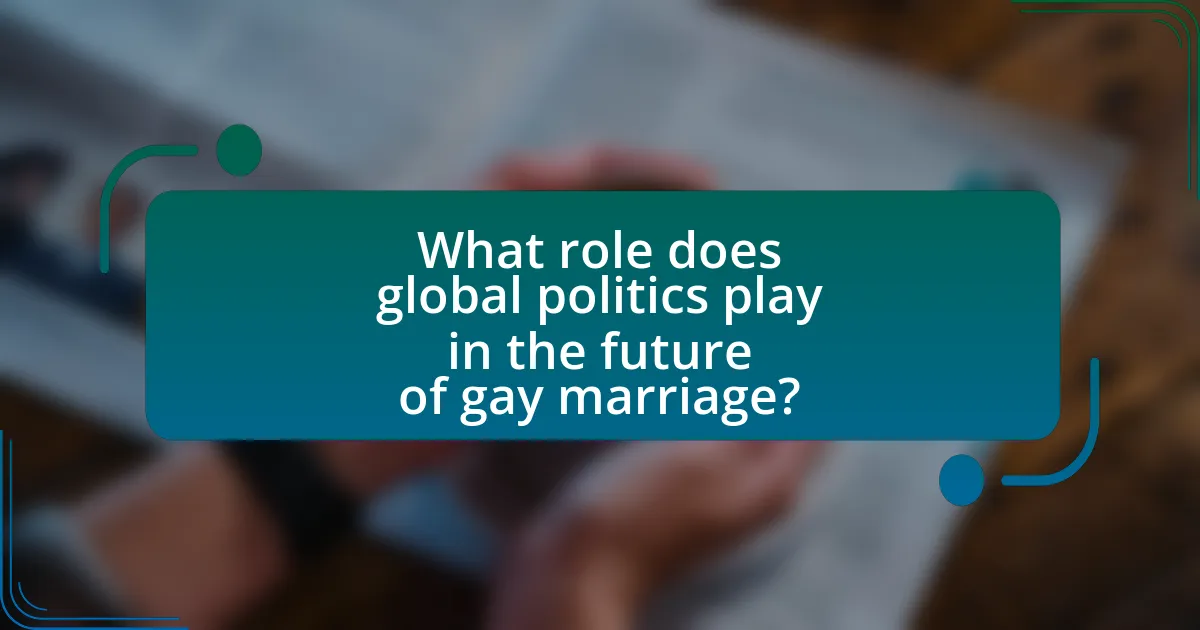
What role does global politics play in the future of gay marriage?
Global politics significantly influences the future of gay marriage by shaping legal frameworks and societal attitudes across nations. For instance, countries that have legalized gay marriage, such as Canada and the Netherlands, often set precedents that encourage similar reforms in other nations, demonstrating a ripple effect in policy changes. Conversely, nations with restrictive laws against LGBTQ+ rights, like Russia and several Middle Eastern countries, can hinder progress and create hostile environments for advocacy. International organizations, such as the United Nations, also play a role by promoting human rights standards that include sexual orientation and gender identity, thereby pressuring governments to adopt more inclusive policies. This interplay of international norms, domestic politics, and advocacy efforts will continue to determine the trajectory of gay marriage globally.
How do international treaties and agreements affect gay marriage rights?
International treaties and agreements can significantly influence gay marriage rights by establishing legal frameworks that promote equality and non-discrimination. For instance, treaties such as the International Covenant on Civil and Political Rights (ICCPR) obligate signatory states to respect and ensure the rights of all individuals, which can include the right to marry regardless of sexual orientation. Additionally, regional agreements like the European Convention on Human Rights have led to court rulings that support the recognition of same-sex marriages in member states. These legal instruments create pressure on countries to align their domestic laws with international human rights standards, thereby advancing the recognition and protection of gay marriage rights globally.
What are the implications of the Universal Declaration of Human Rights on gay marriage?
The Universal Declaration of Human Rights (UDHR) implies that gay marriage is a matter of human rights, particularly under Article 16, which states that men and women of full age have the right to marry and found a family without any limitation due to race, nationality, or religion. This provision supports the argument that sexual orientation should not be a barrier to marriage rights. Furthermore, the UDHR promotes equality and non-discrimination, reinforcing the notion that denying same-sex couples the right to marry violates their fundamental human rights. This framework has influenced various countries to recognize and legalize gay marriage, reflecting a shift towards greater acceptance and protection of LGBTQ+ rights globally.
How do trade agreements influence social policies regarding gay marriage?
Trade agreements can influence social policies regarding gay marriage by promoting human rights standards that include LGBTQ+ rights as part of their frameworks. For instance, countries that enter into trade agreements often commit to upholding certain social standards, which can pressure them to adopt more progressive policies, including the legalization of gay marriage. An example is the European Union’s trade agreements, which frequently tie economic benefits to adherence to human rights, including LGBTQ+ rights, thereby encouraging member states to align their domestic policies with these standards. This linkage can lead to legislative changes in countries where gay marriage is not yet recognized, as governments may seek to improve their international standing and economic relations.
What political movements are advocating for or against gay marriage?
Political movements advocating for gay marriage include the LGBTQ+ rights movement, which seeks equal marriage rights and has gained significant traction in many countries, leading to legalizations in places like the United States and several European nations. Conversely, movements opposing gay marriage often stem from conservative religious groups, such as certain factions within Christianity and Islam, which argue that marriage should be defined as a union between one man and one woman. These opposing movements have influenced legislation in various regions, including attempts to enact constitutional amendments to ban same-sex marriage in countries like Russia and parts of Africa.
How do conservative and progressive political parties differ in their stance on gay marriage?
Conservative political parties generally oppose gay marriage, advocating for traditional definitions of marriage as between one man and one woman. In contrast, progressive political parties support gay marriage, viewing it as a fundamental civil right that promotes equality and social justice. For example, in the United States, the Republican Party has historically resisted legalizing gay marriage, while the Democratic Party has actively championed it, culminating in the Supreme Court’s 2015 decision in Obergefell v. Hodges, which legalized same-sex marriage nationwide. This divergence reflects broader ideological differences, with conservatives prioritizing traditional values and progressives emphasizing individual rights and inclusivity.
What role do grassroots organizations play in shaping public opinion on gay marriage?
Grassroots organizations play a crucial role in shaping public opinion on gay marriage by mobilizing community support and advocating for policy changes. These organizations engage in grassroots campaigning, which includes organizing events, rallies, and educational initiatives that raise awareness about LGBTQ+ rights and the importance of marriage equality. For instance, the Human Rights Campaign has been instrumental in influencing public sentiment through targeted outreach and advocacy efforts, contributing to a significant shift in public opinion; a Gallup poll from 2021 indicated that 70% of Americans support same-sex marriage, a marked increase from 27% in 1996. This transformation in attitudes can be largely attributed to the persistent efforts of grassroots organizations that foster dialogue, challenge stereotypes, and create a sense of community among supporters.
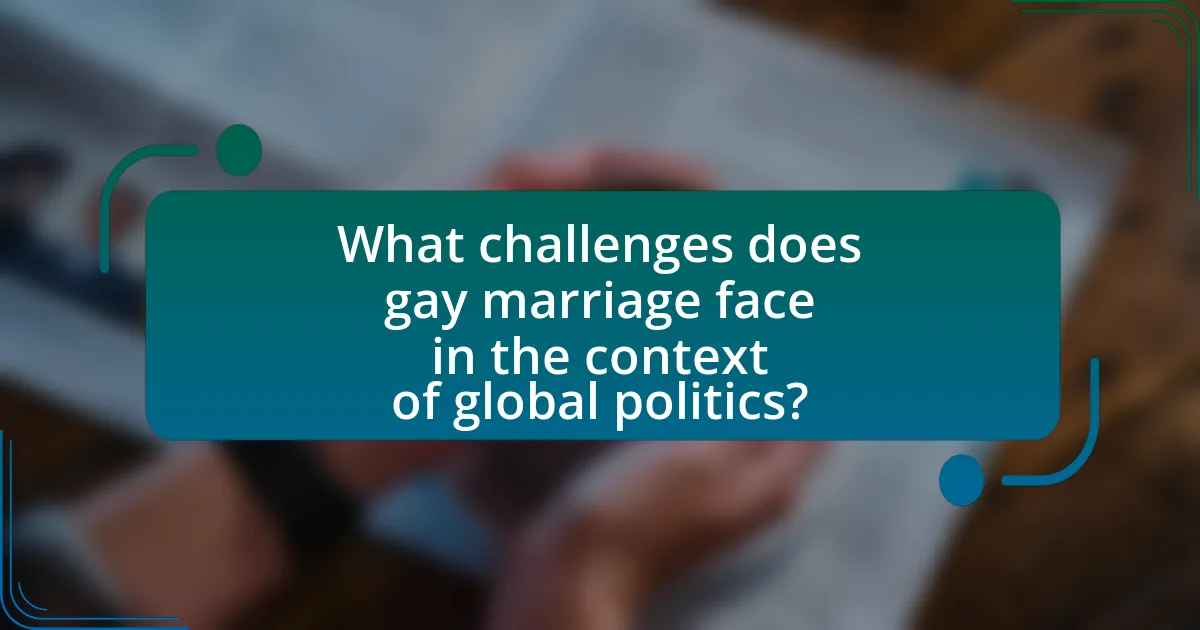
What challenges does gay marriage face in the context of global politics?
Gay marriage faces significant challenges in global politics, primarily due to varying cultural, legal, and religious attitudes towards LGBTQ+ rights. In many countries, particularly in regions such as Africa and the Middle East, legal frameworks explicitly prohibit same-sex marriage, reflecting deep-seated cultural and religious beliefs that view homosexuality as unacceptable. For instance, as of 2023, over 70 countries still criminalize same-sex relationships, which directly impacts the recognition and legalization of gay marriage. Additionally, political leaders in these regions often leverage anti-LGBTQ+ sentiments to consolidate power and rally support, further entrenching opposition to gay marriage. This complex interplay of cultural resistance and political maneuvering creates substantial barriers to the advancement of gay marriage on a global scale.
What are the legal and political obstacles to gay marriage in various regions?
Legal and political obstacles to gay marriage vary significantly across regions, often rooted in cultural, religious, and legal frameworks. In many countries, laws explicitly prohibit same-sex marriage, reflecting societal norms that view marriage as a union exclusively between a man and a woman. For instance, in regions like the Middle East and parts of Africa, legal systems are influenced by religious doctrines that oppose homosexuality, resulting in stringent laws against same-sex relationships and marriage.
In the United States, while the Supreme Court legalized gay marriage nationwide in 2015, some states have enacted laws that undermine this ruling, such as allowing businesses to refuse services based on religious beliefs. Additionally, political opposition from conservative groups continues to challenge the stability of gay marriage rights, as seen in various state legislatures proposing amendments to ban same-sex marriage.
In Eastern Europe, countries like Poland and Hungary have seen a rise in anti-LGBTQ+ sentiment, with governments promoting traditional family values and enacting policies that restrict LGBTQ+ rights. These political climates create significant barriers to the legalization of gay marriage, as public opinion often aligns with governmental stances against it.
Overall, the interplay of legal restrictions, political opposition, and cultural attitudes creates a complex landscape for gay marriage, with significant obstacles persisting in various regions worldwide.
How do religious beliefs impact the political discourse surrounding gay marriage?
Religious beliefs significantly influence the political discourse surrounding gay marriage by shaping public opinion and legislative agendas. Many religious groups advocate against gay marriage based on traditional interpretations of religious texts, which often frame homosexuality as morally unacceptable. For instance, surveys indicate that individuals who identify with conservative religious affiliations are more likely to oppose same-sex marriage, impacting political candidates’ positions and policies to align with their constituents’ beliefs. This opposition can lead to legislative efforts aimed at restricting marriage rights for same-sex couples, as seen in various states where religious exemptions have been proposed to allow discrimination based on sexual orientation. Consequently, the interplay between religious beliefs and political discourse creates a polarized environment, affecting both public policy and societal attitudes toward gay marriage.
What are the consequences of political backlash against gay marriage rights?
Political backlash against gay marriage rights leads to increased discrimination and social stigma against LGBTQ+ individuals. This backlash often manifests in the form of legislative measures that seek to restrict or roll back existing rights, such as the introduction of constitutional amendments or laws that define marriage strictly as a union between a man and a woman. For instance, in the United States, several states have passed laws that undermine the legal recognition of same-sex marriages, resulting in a patchwork of rights that can vary significantly by location. Additionally, such political movements can embolden hate groups and foster an environment of intolerance, as evidenced by a rise in anti-LGBTQ+ hate crimes following high-profile political campaigns against marriage equality. This creates a climate of fear and marginalization for LGBTQ+ communities, impacting their mental health and social well-being.
How does the intersection of LGBTQ+ rights and global politics evolve?
The intersection of LGBTQ+ rights and global politics evolves through increasing recognition and legal protections for LGBTQ+ individuals, influenced by international human rights frameworks and domestic political climates. Over the past few decades, many countries have enacted laws supporting same-sex marriage and anti-discrimination measures, reflecting a shift in societal attitudes and political will. For instance, as of 2023, over 30 countries have legalized same-sex marriage, driven by advocacy from both local and international LGBTQ+ organizations, which have pressured governments to align with global human rights standards. This evolution is further complicated by geopolitical factors, where nations may leverage LGBTQ+ rights as a diplomatic tool or face backlash from conservative factions within their societies.
What trends are emerging in the global fight for LGBTQ+ rights?
Emerging trends in the global fight for LGBTQ+ rights include increased legal recognition of same-sex marriage, growing public support for LGBTQ+ rights, and a rise in activism against anti-LGBTQ+ legislation. For instance, as of 2023, over 30 countries have legalized same-sex marriage, reflecting a significant shift in legal frameworks. Additionally, surveys indicate that public support for LGBTQ+ rights has risen in many regions, with a 2021 Pew Research Center study showing that 70% of Americans support same-sex marriage. Activism has intensified, particularly in response to discriminatory laws in countries like Hungary and Poland, where grassroots movements are mobilizing to challenge these policies.
How do social movements adapt to changing political landscapes regarding gay marriage?
Social movements adapt to changing political landscapes regarding gay marriage by employing strategic advocacy, coalition-building, and leveraging public opinion. For instance, as legal recognition of gay marriage has evolved, movements have shifted their focus from legislative lobbying to broader social acceptance campaigns, utilizing social media to mobilize support and raise awareness. Research indicates that in countries where gay marriage has been legalized, movements have pivoted to address issues such as discrimination and LGBTQ+ rights, demonstrating adaptability in response to the political climate. This strategic evolution is evidenced by the success of campaigns in the United States, where public support for gay marriage increased from 27% in 1996 to over 70% by 2021, reflecting how movements can effectively respond to and shape political discourse.
What practical steps can advocates take to promote gay marriage globally?
Advocates can promote gay marriage globally by engaging in international lobbying efforts to influence policymakers and governments. This can be achieved through forming coalitions with local LGBTQ+ organizations to amplify their voices and create a unified front. Additionally, advocates can utilize social media campaigns to raise awareness and educate the public about the benefits of marriage equality, leveraging statistics that show countries with legalized gay marriage experience positive social outcomes, such as increased mental health and economic benefits. Furthermore, participating in global forums and human rights discussions can help to place pressure on nations that do not recognize gay marriage, highlighting the importance of equality as a fundamental human right.
How can international coalitions strengthen the push for gay marriage rights?
International coalitions can strengthen the push for gay marriage rights by leveraging diplomatic pressure and promoting shared human rights standards among member nations. These coalitions, such as the European Union and the United Nations, can create frameworks that encourage countries to adopt progressive policies by highlighting the social and economic benefits of equality. For instance, countries that recognize gay marriage often experience increased tourism and economic growth, as seen in nations like Canada and the Netherlands, which have reported positive economic impacts post-legalization. Furthermore, international coalitions can facilitate knowledge sharing and best practices, enabling countries to learn from successful implementations of gay marriage rights, thereby fostering a global culture of acceptance and legal recognition.
What strategies have proven effective in changing public policy on gay marriage?
Effective strategies for changing public policy on gay marriage include grassroots mobilization, legal challenges, and public education campaigns. Grassroots mobilization has been crucial, as seen in the efforts of organizations like the Human Rights Campaign, which organized rallies and community outreach to build support. Legal challenges, such as the landmark case Obergefell v. Hodges in 2015, demonstrated the effectiveness of judicial avenues in securing marriage equality through the courts. Public education campaigns have also played a significant role, utilizing media and personal stories to shift public opinion; for instance, surveys indicate that public support for gay marriage increased from 27% in 1996 to over 70% by 2021, reflecting the impact of sustained advocacy and awareness efforts.
